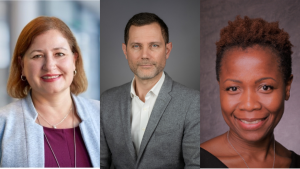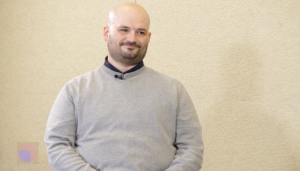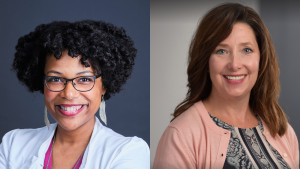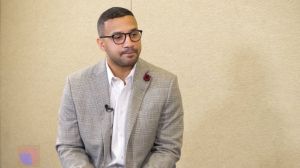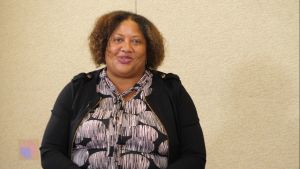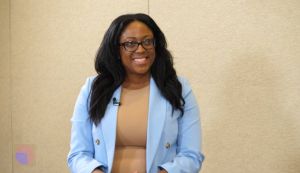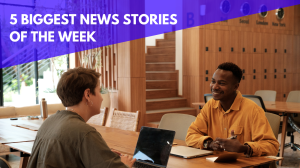Following the murder of George Floyd, many companies got more intentional and focused on their diversity, equity and inclusion efforts than ever before. For some, that meant hiring their first Chief Diversity Officer while others had to experience a shakeup in leadership around diversity entirely.
For Chief Diversity Officers, the last few years has been tumultuous. Some have sought new roles as former employers failed to deliver on promises and others chased new challenges where they felt they could make a greater impact, find better resources or simply grow their own careers.
This interview is the latest in a series of articles dedicated to catching up with CDOs who have moved in recent years to discuss their experience, what the move has done for them, the work they’re doing and the advice they have for other aspiring or current CDOs.
Adrienne Trimble is an expert in supplier diversity turned to DEI leader in charge of diversity at Sysco, the global leader in marketing and distribution of food products, kitchen equipment and smallware for the hospitality, education and healthcare industries. She has experience working as part of the business growth engine, the National Minority Supplier Diversity Council (NMSDC) and has taken over a team ready to evolve its DEI efforts to the next level.
Interview with Adrienne Trimble
Fair360, formerly DiversityInc: You worked at National Minority Supplier Diversity Council for a couple of years. Can you talk about that experience and what impact it had on your perspective on DEI work? What were some of the most important lessons you bring into working at a company like Sysco?
Adrienne Trimble: “That time at the National Minority Supplier Development Council was the highlight of my career. Being able to be a voice and advocate for minority businesses during a global pandemic when most of them were facing supply chain shortage disruption was a highlight. From a professional perspective, I learned just how important it is to really understand how you can help people [learn] where they are in terms of DEI, understanding where they are in their journey and how you can help bring them along. For example, at that time, I was working with a White House Administration that really didn’t distinguish between small businesses and minority owned businesses. Those of us who have been advocates and champions for disenfranchised or underutilized businesses understand that there are unique circumstances that impact them and how do you begin to level the playing field so that they can be able to perform at the same level as other companies. Understanding that and being able to articulate it in a way to get those who can influence policies and resources to be able to provide for them, that was probably the biggest learning point for me.
“For me personally, it was learning to use my voice and my own sphere of influence to be able to help those who were most vulnerable. Being that champion, that advocate and being okay to walk away from situations that are not necessarily healthy for me personally over those I’m trying to be an advocate of change on their behalf. Taking those lessons into Sysco was extremely valuable. Sysco was ready for DEI, they had already begun the journey of looking at ways to be more inclusive. Our new CEO, Kevin Hourican, is committed to making a difference, not just for Sysco, but for the food service industry. Looking at it from a holistic perspective of those that we do business with, being able to create opportunities for diverse suppliers who can then turn around and make those communities even stronger by creating discretionary disposable income in those communities has a direct tie to education levels, poverty, job opportunity.”
DI: What sort of impact has the move to Sysco had on your career and how would you describe your time with the company thus far?
AT: “When I joined Sysco in 2021, I became the company’s first Chief Diversity Officer. As I mentioned, there was already some groundwork that had been laid. It gave me the opportunity to come in and build a strategy that would move the company forward. We were able to build a three-year DEI roadmap that we’re now operationalizing and in the process of implementing and executing. The impact I’ve been able to have just coming in has been incredible, because it allowed us to understand the parts of the business that we needed to leverage DEI to make us a better business, to make us more competitive and make sure that we were hiring the right people.
“Since I joined, I have assumed responsibility for our culture, engagement and overall employee experience for the company. That’s been an incredible opportunity to really show how the work does tie to our purpose, which is to connect the world to share food and care for one another. We are embedding that in everything that we do in our DEI strategy is the foundation for that.”
DI: What are some of the initiatives you’ve been excited to work on since joining Sysco and what are some of the lessons you’ve learned through that work?
AT: “The first thing that I had the opportunity to do is stand up our global DEI Advisory Council. That is a council that has representation from around the world and different levels of employees to get the best insights. They walked alongside me to help build out the company’s DEI strategy and it really was a powerful exercise because we had folks who were so passionate about the work and who really wanted to help the company be better in this space.
“That was one initiative that I was extremely excited about. And what went hand-in-hand in that is that we only were able to select 25 to 27 people to be on our DEI Advisory Council. When we rolled out the initiative, we had over 600 people raise their hands to be a part of it around the world, so for those that we were not able to select this part of the council, we deputized them as our DEI ambassadors. We work with them to try to provide them education, awareness and understanding of our strategy and how it’s impacting the business.
“The third was really helping our merchandising and strategic sourcing teams build out a more robust approach for supplier inclusion. We moved from a supplier diversity program to a sourcing strategy process for how we bring in diverse suppliers. Moving our definition from looking at minority and women-owned businesses to being more inclusive itself so that we’re looking at businesses that are certified as LGBTQ+, disabled or veteran-owned businesses as well. We’ve actually held our very first Supplier Diversity Summit, which allowed us to help those looking to do business with Sysco understand how to navigate such a complex company in a complex business. That was the impetus for a lot of change. We implemented DEI scorecards for our executive leadership team, and those are the individuals that are direct reports to our CEO. By putting a scorecard in place, that really helped them think through how they were showing up in leading in the DEI efforts for the company. We measure them in areas such as their personal leadership, how they manage their talent management strategies as well as business relationships, which includes supplier diversity. These objectives are tied to their compensation, so it was really a great way to kind of jumpstart the initiatives.”
READ MORE WHERE ARE THEY NOW STORIES
DI: How do you see DEI work evolving in the years to come and what excites you about the future?
AT: “I think that companies are finally starting to get it. There have been studies for the last 20 years that have shown that companies that truly operate in a more inclusive manner have stronger financial results, stronger customer satisfaction, stronger retention initiatives with their employees, the list goes on and on. I think companies are finally starting to wake up to say, ‘OK, this is real.’”
“What excites me about this is, now that we have the attention of corporate America, we can truly integrate this into the business. It becomes the way we do business so that we can move away from this model of having a Chief Diversity Officer that is driving initiatives, but you equip the leaders of the business to lead more inclusively and understand it’s just a part of their leadership style and the way that they deliver to be able to meet the demands of their customers. That’s what really excites me and that is how I see it evolving over time. It just gets so engrained into a company’s DNA, that it becomes a part of their value statement, it becomes a part of their purpose and part of the business philosophy.”
DI: What advice do you have for aspiring or current Chief Diversity Officers who are thinking about moving from where they are? What do they need to think about as they consider companies, negotiations, teams, etc.?
AT: “The first thing is to understand how engaged the senior leadership team is, including the CEO, in this work. When I was having conversations with companies that were looking to hire Chief Diversity Officers, if I didn’t meet with the CEO directly, then I knew it was not a good fit for me. This is a top-down initiative and it has to start at the top. I will even take that a step further to understand if it’s a publicly held company, how are the Board of Directors holding leadership accountable for ensuring that there is a robust strategy?
“The second I would take a look at is what resources you’ll have available to you. Ask those questions up front. If you’re in a position that you’re going to be a one-person team trying to take on such a significant piece of work, you’re setting yourself up for failure. Look at resources from a people perspective as well as a financial perspective to ensure that you are being given the ability to build a war chest that will help you be successful in the role.
“Additionally, I would talk to some of the actual customers and understand from their perspective, how is the DEI showing up from a customer perspective? And how is it showing up in their communities? That lets you know a lot about if these initiatives truly are integrated, or there’s a passion or a willingness to integrate it.”








